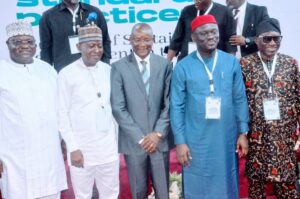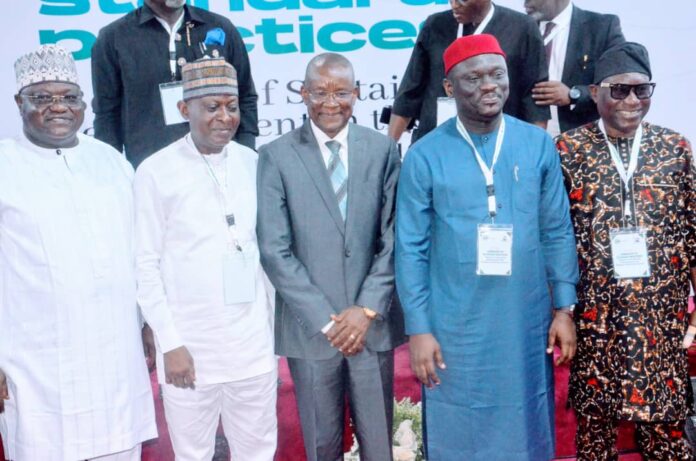The Director General/Chief Executive of the Standard Organisation of Nigeria (SON), Dr. Ifeanyi Chukwunonso Okeke, has attributed the recent cases of building collapse in Nigeria to non-adherence to standards and codes of practice in the construction process.
Dr. Okeke made this statement yesterday at a one-day stakeholders’ forum on the building industry in Nigeria, held at the NAF Centre in Abuja.
He emphasized that despite numerous sensitization and awareness campaigns by SON, many stakeholders and practitioners remain unaware of the required standards for safe, durable, and sustainable buildings, leading to frequent building collapses that endanger lives.
The SON DG urged builders to prioritize quality and safety above others, while the Minister charged stakeholders to unite for safe construction.
By addressing these factors and adhering to standards and codes of practice, he said Nigeria can reduce the incidence of building collapse and ensure safer construction practices.
He said despite many sensitization and awareness campaigns carried out by SON over the years, many industry stakeholders and practitioners still lack awareness of the standards required for safe, durable and sustainable buildings, resulting to the incessant building collapses that endangers lives, loss of property and damaging public trust in the country.
‘‘This knowledge gap exists not only among construction workers but also among suppliers and building professionals. Training and education are essential to bring everyone up to par with international best practices, but that may not be all there is.
‘‘In the same way, our growing population requires a rapid increase in affordable housing, which brings with it the challenge of meeting demand without compromising on quality. Innovative materials, construction techniques and designs must be developed and standardized to meet this demand while maintaining quality and safety.
‘‘However, SON has a mandate to develop, approve and enforce standards across all sectors, including the building and construction industry. As we confront the challenges in this sector, SON is dedicated to promoting safe practices, ensuring quality and supporting sustainable development through several other initiatives.
‘‘SON has worked closely and will continue to do so with industry experts and practitioners to develop and update standards for construction materials, techniques and safety protocols. We have adopted a proactive approach, ensuring that these standards are not only up to date but also responsive to the latest industry trends, technologies and best international practices to improve the quality of materials and reduce substandard products.
‘‘Our Mandatory Conformity Assessment Program (MANCAP) ensures that locally manufactured products meet minimum quality standards. The Standards Organisation of Nigeria Conformity Assessment Program (SONCAP) controls the quality of imported materials and preventing substandard items from entering our market.
‘‘SON cannot achieve these goals all alone. We are committed to working with other government agencies, professional associations, industry leaders and international partners to evolve a cohesive approach to tackling quality and safety issues.’’
He therefore urged all players in the sector to prioritize quality and safety above all else. ‘‘Every stakeholder, from contractors to suppliers, must be committed to using approved materials and adhering strictly to standards. A “quality-first” mentality is the foundation upon which a safe, resilient and prosperous building sector can be achieved.
‘‘As we continue to develop our nation, we must do so with sustainability in mind. Adopting eco-friendly practices, investing in sustainable materials and designing resilient structures are no longer optional, they are as imperative as research and development. There is a need to work collectively to bridge knowledge gaps, promote adherence to standards and build a culture of quality and accountability.
‘‘In line with the President’s Renewed Hope Agenda, we are focused on encouraging a resilient and self-reliant building and construction sector that serves as a backbone for economic growth and social progress.’’
While declaring the conference open, the Minister of State for Trade and Investment, Recent Activities. Hon. Minister of State for Industry, Trade and investment, Sen. John Owan Enoh said standards are compromised in terms of dimensions, and diameters and even in block molding because most people like to cut corners when it comes to building and construction.
For him, adherence to standards remains the bedrock for sustainable and development in building and construction sector.
‘‘We live in a country where people try to observe laws and standards in the bridge. Compromising what the standard should be is almost becoming a norm. This sector is the most robust in the country, so desirable and critical important.
‘‘This forum could not have come at a better time. For both son and stakeholders here, they should find out what the challenge is and should be done. To tackle the menace, it requires courage and it is possible for us to do it,’’ he said.
READ ALSO: FCTA arrests scavengers damaging Abuja’s infrastructure
EFCC boss calls for more aggressive approach against corruption
He then charged relevant stakeholders in the industry to unite and collaborate for safety of structures.

‘‘President Tinubu’s administration is currently on a journey to reset the country back on path of economic growth and prosperity, such that the security of lives and property will be uppermost in the agenda of the current administration.
‘‘So, putting a stop to the incidence of building and construction collapses is a priority, I believe that adherence to strict building code of practice and standard construction practices will be our contribution to the administration.
‘‘You must focus on areas of pre-construction, in construction, post-construction regulatory framework in the promotion of public awareness as well as capacity building enhancement,’’ he added, assuring that the ministry will be with them in the journey.

